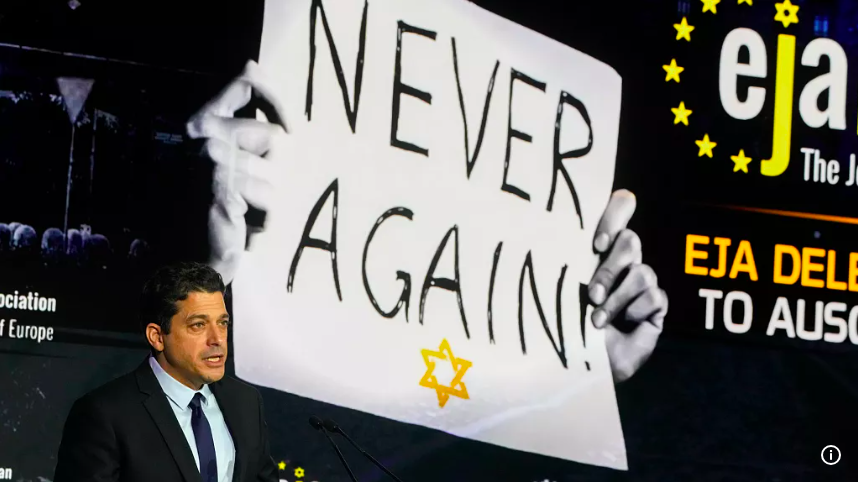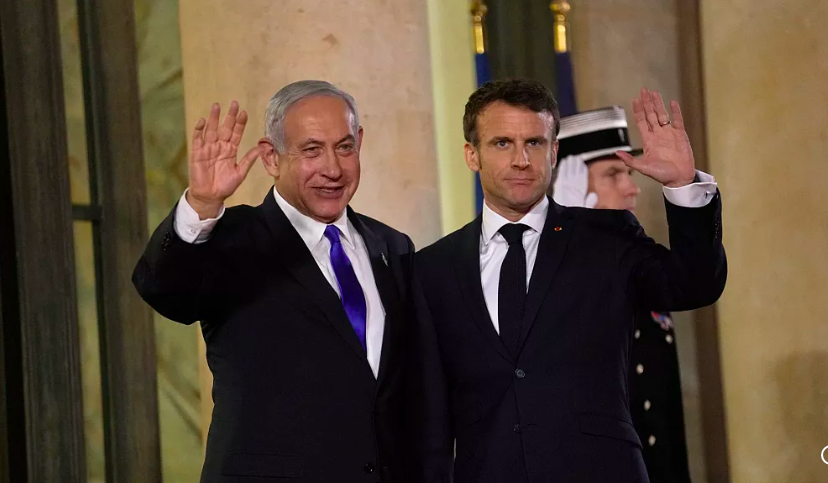Israel Accuses Europe of Rising Antisemitism Amid Gaza War, Most hostile to the Jewish Community: Focus on Spain, Ireland, and Macron's Comments
Quote from Alex Bobby on May 15, 2025, 4:43 AM
Rising Tensions: Israel Accuses Europe of Sharp Spike in Antisemitism Amid Gaza War
A new Israeli government report has spotlighted a dramatic surge in antisemitism across Europe in 2024, directly linking the rise to the aftermath of the October 7 Hamas attacks and Israel’s subsequent military campaign in Gaza. According to the report, some European nations have seen a sixfold increase in antisemitic incidents, prompting concerns about growing hostility toward Jewish communities on the continent.
Israel’s Minister for Diaspora Affairs and Combating Antisemitism, Amichai Chikli, identified Spain and Ireland as the most notable examples of this trend. In an exclusive interview with Euronews, Chikli said both countries have shifted toward open hostility against Israel and Jews, pointing to their formal recognition of a Palestinian state and their vocal criticism of Israel’s military actions.
Escalating Diplomatic Friction
Chikli harshly criticised Irish Taoiseach Micheál Martin’s recent comments in which he described the situation in Gaza as “hell on earth” and accused Israel of committing war crimes. The Israeli minister responded by labelling Martin’s comments as “violent antisemitism,” especially in the context of remarks made on Holocaust Remembrance Day.
Chikli also took issue with Spain’s participation in the International Criminal Court (ICC) case against Israel for alleged war crimes in Gaza. Spanish Foreign Minister José Manuel Albares previously emphasised that antisemitism has no place in Spanish society and is criminalised under Spanish law. He also asserted that freedom of expression remains protected, suggesting that criticism of Israeli government actions does not equate to hatred against Jews.
Norway, another country that has recognised Palestinian statehood, is also referenced in the broader context of European policies Israel deems hostile.
France Under Fire: Macron Criticised by Netanyahu
France was also heavily criticised in the Israeli report, particularly for President Emmanuel Macron’s recent remarks on the war in Gaza. Macron called Israel’s actions “shameful” and urged the European Union to consider sanctions over the worsening humanitarian crisis, including widespread famine in the enclave.
In response, Israeli Prime Minister Benjamin Netanyahu lashed out at Macron, accusing him of siding with Hamas by criticising Israel’s military campaign. “Instead of supporting the Western democratic camp fighting Islamist terror, Macron is demanding Israel surrender and reward terrorism,” Netanyahu said.
Macron’s comments are part of a pattern of increasing diplomatic friction with Israel. In April, the French president floated the idea of recognising a Palestinian state “because at some point it will be fair,” which provoked Netanyahu’s “fierce opposition,” according to an official Israeli statement.
A Political Realignment?
One of the most striking elements of the new report is Israel’s changing political alignments in Europe. Once an ally of centrist and left-leaning leaders, Israel now finds itself gravitating toward right-wing parties. Chikli singled out France’s far-right National Rally (RN) and Spain’s Vox as potential allies.
Marine Le Pen, leader of the RN and daughter of known Holocaust denier Jean-Marie Le Pen, has reportedly distanced herself from her father’s controversial legacy. According to Chikli, her public support for the Jewish community since October 7 — including participation in an anti-antisemitism rally — marks a significant turn. He also praised her opposition to the ICC case against Israeli leaders.
This shift reflects a broader realignment of Israel’s diplomatic priorities in Europe, with traditional alliances increasingly strained by differing views on the Gaza war and Palestinian statehood.
The Humanitarian Crisis in Gaza
Since the breakdown of ceasefire talks in early March, Israel has maintained a blockade on Gaza, preventing food and medicine from entering the territory. Humanitarian experts warn that the enclave’s population now faces a real threat of famine. Human rights organizations have accused Israel of using starvation as a weapon of war — a claim Israel firmly denies.
The Israeli government argues that Hamas, which launched the October 7 assault that killed 1,200 people and took around 250 hostages, is hoarding aid and exploiting the humanitarian crisis to bolster its military wing.
Meanwhile, the international community remains deeply divided. Some European leaders demand immediate Israeli restraint, while others emphasise Israel’s right to self-defence. This diplomatic fragmentation is mirrored in the rising antisemitism and polarised public opinion across the continent.
Conclusion
The Israeli government’s new report draws attention not only to the rise in antisemitism but also to a dramatic reconfiguration of diplomatic relationships in Europe. Accusations are flying from all sides — Israel calling out European leaders for emboldening antisemitism, while European leaders increasingly criticise Israel’s war conduct. In the middle are Jewish communities in Europe, facing a reported spike in hostility, and Palestinians in Gaza, suffering under one of the worst humanitarian crises in recent history. As the war drags on, the fallout continues to reshape political alliances and ignite moral and legal battles across continents.

Rising Tensions: Israel Accuses Europe of Sharp Spike in Antisemitism Amid Gaza War
A new Israeli government report has spotlighted a dramatic surge in antisemitism across Europe in 2024, directly linking the rise to the aftermath of the October 7 Hamas attacks and Israel’s subsequent military campaign in Gaza. According to the report, some European nations have seen a sixfold increase in antisemitic incidents, prompting concerns about growing hostility toward Jewish communities on the continent.
Israel’s Minister for Diaspora Affairs and Combating Antisemitism, Amichai Chikli, identified Spain and Ireland as the most notable examples of this trend. In an exclusive interview with Euronews, Chikli said both countries have shifted toward open hostility against Israel and Jews, pointing to their formal recognition of a Palestinian state and their vocal criticism of Israel’s military actions.
Register for Tekedia Mini-MBA edition 19 (Feb 9 – May 2, 2026): big discounts for early bird.
Tekedia AI in Business Masterclass opens registrations.
Join Tekedia Capital Syndicate and co-invest in great global startups.
Register for Tekedia AI Lab: From Technical Design to Deployment (next edition begins Jan 24 2026).
Escalating Diplomatic Friction
Chikli harshly criticised Irish Taoiseach Micheál Martin’s recent comments in which he described the situation in Gaza as “hell on earth” and accused Israel of committing war crimes. The Israeli minister responded by labelling Martin’s comments as “violent antisemitism,” especially in the context of remarks made on Holocaust Remembrance Day.

Chikli also took issue with Spain’s participation in the International Criminal Court (ICC) case against Israel for alleged war crimes in Gaza. Spanish Foreign Minister José Manuel Albares previously emphasised that antisemitism has no place in Spanish society and is criminalised under Spanish law. He also asserted that freedom of expression remains protected, suggesting that criticism of Israeli government actions does not equate to hatred against Jews.
Norway, another country that has recognised Palestinian statehood, is also referenced in the broader context of European policies Israel deems hostile.
France Under Fire: Macron Criticised by Netanyahu
France was also heavily criticised in the Israeli report, particularly for President Emmanuel Macron’s recent remarks on the war in Gaza. Macron called Israel’s actions “shameful” and urged the European Union to consider sanctions over the worsening humanitarian crisis, including widespread famine in the enclave.
In response, Israeli Prime Minister Benjamin Netanyahu lashed out at Macron, accusing him of siding with Hamas by criticising Israel’s military campaign. “Instead of supporting the Western democratic camp fighting Islamist terror, Macron is demanding Israel surrender and reward terrorism,” Netanyahu said.
Macron’s comments are part of a pattern of increasing diplomatic friction with Israel. In April, the French president floated the idea of recognising a Palestinian state “because at some point it will be fair,” which provoked Netanyahu’s “fierce opposition,” according to an official Israeli statement.
A Political Realignment?
One of the most striking elements of the new report is Israel’s changing political alignments in Europe. Once an ally of centrist and left-leaning leaders, Israel now finds itself gravitating toward right-wing parties. Chikli singled out France’s far-right National Rally (RN) and Spain’s Vox as potential allies.
Marine Le Pen, leader of the RN and daughter of known Holocaust denier Jean-Marie Le Pen, has reportedly distanced herself from her father’s controversial legacy. According to Chikli, her public support for the Jewish community since October 7 — including participation in an anti-antisemitism rally — marks a significant turn. He also praised her opposition to the ICC case against Israeli leaders.
This shift reflects a broader realignment of Israel’s diplomatic priorities in Europe, with traditional alliances increasingly strained by differing views on the Gaza war and Palestinian statehood.
The Humanitarian Crisis in Gaza
Since the breakdown of ceasefire talks in early March, Israel has maintained a blockade on Gaza, preventing food and medicine from entering the territory. Humanitarian experts warn that the enclave’s population now faces a real threat of famine. Human rights organizations have accused Israel of using starvation as a weapon of war — a claim Israel firmly denies.
The Israeli government argues that Hamas, which launched the October 7 assault that killed 1,200 people and took around 250 hostages, is hoarding aid and exploiting the humanitarian crisis to bolster its military wing.
Meanwhile, the international community remains deeply divided. Some European leaders demand immediate Israeli restraint, while others emphasise Israel’s right to self-defence. This diplomatic fragmentation is mirrored in the rising antisemitism and polarised public opinion across the continent.
Conclusion
The Israeli government’s new report draws attention not only to the rise in antisemitism but also to a dramatic reconfiguration of diplomatic relationships in Europe. Accusations are flying from all sides — Israel calling out European leaders for emboldening antisemitism, while European leaders increasingly criticise Israel’s war conduct. In the middle are Jewish communities in Europe, facing a reported spike in hostility, and Palestinians in Gaza, suffering under one of the worst humanitarian crises in recent history. As the war drags on, the fallout continues to reshape political alliances and ignite moral and legal battles across continents.
Uploaded files:Share this:
- Click to share on Facebook (Opens in new window) Facebook
- Click to share on X (Opens in new window) X
- Click to share on WhatsApp (Opens in new window) WhatsApp
- Click to share on LinkedIn (Opens in new window) LinkedIn
- Click to email a link to a friend (Opens in new window) Email
- Click to print (Opens in new window) Print



